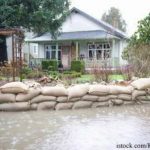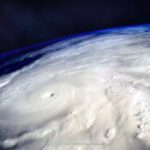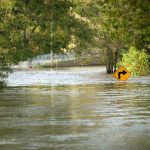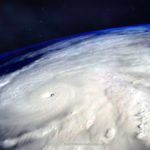With Hurricane Milton poised to hit Florida tomorrow, and people still cleaning up from Helene, there are some things you need to know about flood water. Drowning and building damage are not the only risks from floods. And this water is not just dirty. Flood waters contain chemicals, pollutants, bacteria, toxins, and viruses that can make you sick. And eating food or drinking water contaminated with these waters can be very dangerous. Even containers that you think are sealed are not impervious to flood water. Charlotte County issued a bulletin about these dangers. First, if you are under a boil water notice, use commercially boiled water for mixing baby food formula. Wash your hands with soap and either disinfected or boiled and cooled water, especially before preparing or … [Read more...]
Food Safety Emergency Preparedness Before a Storm
Get food safety emergency preparedness tips before a storm from the USDA. September is National Food Safety Education Month and emergency Preparedness Month. And with Hurricane Helene bearing down on the southeastern United States, it's time to get ready. For a chart about how to prepare, see Food Safety Before An Emergency. Knowing how to keep your food and water safe will minimize danger from spoiled food and reduce the risk of foodborne illness. It's a good idea to always be ready, but when a storm watch or warning is issued, start to prepare. First, fill empty spaces in your freezer with frozen plastic jugs of water or bags of ice. They can serve as fresh water as needed. And freeze items you don't need right away. Fill jugs with fresh water and fill your bathtub as well. … [Read more...]
FDA Food Safety Tips For the Hurricane Season
The FDA is offering food safety tips for the hurricane season, including what to do about power outages and flooding. There are lots of things to think about and do, including safeguarding medications, water, and pets. Everyone, not just people in hurricane-prone areas, should maintain a waterproof emergency kit that is stocked with non perishable food, extra medication, and hygiene supplies. Non perishable food includes shelf stable items including canned food such as tuna, vegetables, fruits, and soups, bread, peanut butter, granola bars, crackers, nuts, trail mixes, mayonnaise, mustard, dried milk, and jams and jellies. Be sure to include a can opener. Food, water, and medical supplies will be hard to find both before and after a storm. Make sure that you have enough of your … [Read more...]
FightBac Food Safety Tips For Hurricane Season
FightBac food safety tips for hurricane season have been released as Hurricane Ian approaches the southeastern United States, more specifically the west coast of Florida. Hurricanes can cause floods and power outages that can make food unsafe to eat and water unsafe to drink. These tips will help protect your family and pets from foodborne illness during and after a hurricane and other storms. It's important to prepare before the storm if you can. After you have finished securing your home and property, if you are riding out the storm, purchase and store food and water for your household in case the food supply is disrupted. Every person and pet should have at least one gallon of fresh potable water every day. For food, purchase non-perishable foods that have a long shelf life. … [Read more...]
How to Recover Food After Flooding From Hurricane Ida
Hurricane Ida has made landfall in Louisiana and catastrophic flooding has affected thousands. After a flood, there are things you can do to recover food after flooding, according to the FDA. Please note that only food that is packaged in completely waterproof containers is salvageable. For water, boiling and disinfecting with bleach will cost most, but not all, disease-causing pathogens. First, filter water through clean cloths, or let it settle and draw off the lear water. Boil the water for one minute, let it cool, and store in clean containers. Or add 1/8 teaspoon (8 drops) of unscented liquid chlorine bleach per gallon of water. Stir it and let stand for at least 30 minutes before you use it. Food containers that are waterproof including undamaged, commercially prepared … [Read more...]
Are You Ready For a Hurricane? Get Tips From the FDA
Are you ready for a hurricane? With the news of Tropical Depression Fred wreaking havoc on the east coast, and Tropical Storm Henri on the horizon, now is the time to prepare if you live in a hurricane zone. These tips apply across the country in any type of severe weather. The FDA has great tips and information you need to know. These storms can cut off water supplies and threaten the food supply. Before a storm, make sure you have thermometers in your refrigerator and freezer, and stock up on coolers, frozen gel packs, and dry ice to keep reefrigerated food at or below 40°F and frozen food at or below 0°F if you lose power. And stock up on bottled water and nonperishable food and put it as high up on shelves as you can in case of floods. Also make sure you have a manual can opener … [Read more...]
Food Safety Tips During Hurricanes and Severe Storms
With the first named Atlantic hurricane approaching the U.S. mainland, the USDA is offering food safety tips during hurricanes and severe storms. The best thing to do is to be prepared before storms hit. And this advice applies to all Americans, not just those who live in hurricane-prone areas. First, make sure that you keep an appliance thermometer in your refrigerator and freezer. The freezer must be kept at 0°F or below, and the refrigerator between 33°F and 40°F to slow down most bacterial growth. Then, freeze containers of water for ice to help keep food frozen in the freezer or cold in the fridge or in coolers if the power goes out. Make more ice cubes too. You can also use this ice for drinking water if flooding occurs and you need a clean source of water. Freeze … [Read more...]
Hurricane Season Is Here: Be Prepared During the Pandemic
The U.S. Consumer Product Safety Commission is offering tips on how to stay safe during the 2020 Atlantic hurricane season in the middle of the coronavirus pandemic. CPSC Acting Chairman Robert Adler said in a statement, "Powerful storms and hurricanes are likely to affect millions of Americans who are already dealing with the stress that comes with a pandemic. That is why we urge everyone now more than ever, to be informed, be prepared and be safe." The hurricane season begins June 1 and runs through November. There are things you can do before the storm. Keep freezers full, since that helps the appliance keep food at a safe temperature longer. Keep water on hand too; each person in your household should have one gallon of clean water per day. If you must evacuate to a shelter, … [Read more...]
Food and Water Safety Advice For Those in Hurricane Dorian’s Path
The FDA is offering food and water safety advice for those in Hurricane Dorian's path. The hurricane is making its way up the eastern coast of the United States this week. Hurricane warnings have been posted for the coasts of both North and South Carolina. When the power goes out, consumers need to take special precautions to make sure that the food stored in their homes remains safe. First, keep refrigerator and freezer doors closed as much as possible. The fridge will keep food cold for about four hours, and a full freezer will keep the temperature low for about 48 hours if the door stays closed. Dry and block ice can be used to keep food safe for longer periods of time. Fifty pounds of dry ice will keep an 18 cubic foot, fully stocked freezer cold for two days. Flooding … [Read more...]
Affected By Hurricane Michael? Get USDA’s Food Safety Tips
Hurricane Michael has come and gone in the U.S. Southeast. But its effects are going to last for a long time. The storm surge caused severe flooding, and many people are still without power. If you were affected by this hurricane, the USDA has some tips for you. First of all, never eat food that has been in contact with flood water. That water is extremely dirty and can contain all types of pathogens, from deadly bacteria to parasites and viruses. Discard any raw fruits or vegetables, cartons, of milk, or eggs that may have touched flood water, however briefly. And don't assume that what you think are waterproof containers are safe. Food containers that are not waterproof include any made of plastic or cardboard. The type of closure makes a difference too. Screw-caps, snap lids, … [Read more...]








